
The Easybeats were an Australian rock band that formed in Sydney in late 1964. They enjoyed a level of success that in Australia rivalled The Beatles. They became the first Australian rock act to score an international hit, with the 1966 single "Friday on My Mind", as well as one of the few in Australia to foreground their original material.

Johannes Hendrikus Jacob van den Berg, better known as his stage name Harry Vanda, is a Dutch Australian musician, songwriter and record producer. He is best known as lead guitarist of the 1960s Australian rock band the Easybeats who with fellow member George Young formed the 1970s and 1980s songwriting and record production duo Vanda & Young.

George Redburn Young was an Australian musician, songwriter and record producer. He was a founding member of the bands the Easybeats and Flash and the Pan, and was one-half of the songwriting and production duo Vanda & Young with his long-time musical collaborator Harry Vanda.
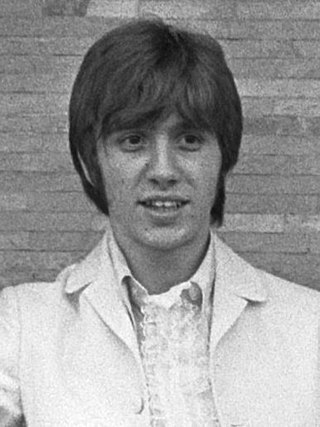
Stephen Carlton Wright was an Australian singer, songwriter, and musician. Called Australia's first international pop star, he is best known for being the lead singer of the Easybeats, who are widely regarded as the greatest Australian pop band of the 1960s.
"Evie" is a rock song performed by Australian singer and former frontman of the Easybeats, Stevie Wright. It was written by Harry Vanda and George Young and released as a single in 1974. It has been suggested that it is the first 11-minute song to chart at #1 anywhere in the world.

Albert Productions, a division of music publishing and recording company Albert Music, is one of Australia's longest established independent record labels to specialise in rock and roll music. The label was founded in 1963 by Ted Albert, whose family owned and operated the Sydney music publishing house J. Albert & Son.

Easy is the debut studio album by the Australian rock band the Easybeats, released on 23 September 1965.

The Best of The Easybeats + Pretty Girl is the first compilation album by The Easybeats featuring a selection of songs recorded by the group between 1965 and 1966. The album was originally released in Australia and New Zealand under the Parlophone label under the then current licensing arrangement by the band's production company Albert Productions.
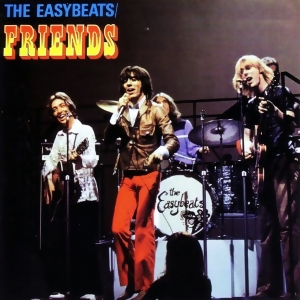
Friends is the sixth and final studio album by Australian rock band the Easybeats. It was released in early 1970 as part of the group's new recording contract with Polydor Records. It would be the only album Polydor released of the band as they broke up before its release.
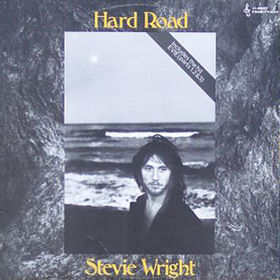
Hard Road is the debut solo album from Australian singer Stevie Wright. The album's first single "Evie " was hugely successful and the title track was later covered on Rod Stewart's 1974 album Smiler. The album itself reach #2 on the Australian albums charts in 1974 was the 16th highest selling album in Australia that year. The compact disc is currently out-of-print and has become quite rare. A digital edition was available on iTunes as of June, 2014.

Good Friday is the fourth studio album by The Easybeats, released in May 1967. It was the first album released after the band signed an international recording deal with United Artists Records. The original UK album was released in May 1967. Although "Friday on My Mind" was a big single in the UK, the album failed to make the top 40.

Friday On My Mind is the first North American album from The Easybeats. The album was released as Good Friday in Europe, in the same month. This version omitted "Hound Dog" and replaced it with "Women" from the Australian It's 2 Easy album.

"The Music Goes 'Round My Head" is a 1967 song and single by Australian rock group The Easybeats, which was written by band members George Young and Harry Vanda.

"For My Woman" is a song by Australian rock band the Easybeats, written by singer Stevie Wright and guitarist George Young. The Easybeats had formed in Sydney in 1964, with a sound inspired by the Pretty Things and the Rolling Stones. After signing with their manager Mike Vaughan, he introduced the band to producer and businessman Ted Albert, who liked them enough to sign with his company Albert Productions in December 1964. The song was recorded in January 1965 at the 2UW Theatre in Sydney as a demo together with three other songs.
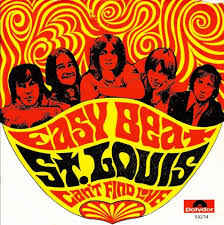
"St. Louis" is a song by Australian rock group the Easybeats, which was released in June 1969. It was co-written by its members Harry Vanda and George Young and recorded as their first single after signing to Polydor Records.

"Come and See Her" is a song written by Stevie Wright and George Young. It was released as the sixth single for their Australian rock group the Easybeats in April 1966, which reached No. 3 on the Australian charts. It was the group's debut single in the United Kingdom, issued on the United Artists Records in July.
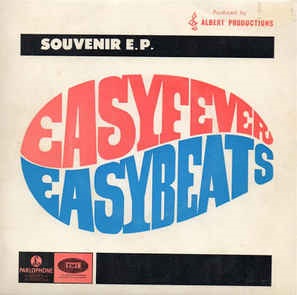
Easyfever by Australian rock and roll group the Easybeats was their fourth official extended play. It was issued to coincide with the band's departure for the United Kingdom. It appeared in August 1966 and reached number one on the Australian singles charts, something that had only been achieved once before by an EP. The songs on the EP did not appear on any of the Easybeats' official studio albums, however, they were included as bonus tracks on the 1992 CD reissue of their It's 2 Easy album.
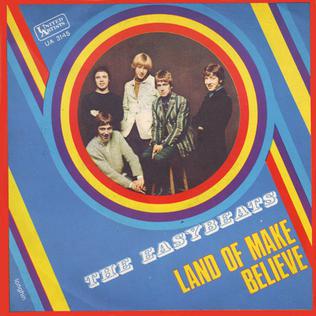
"Land of Make Believe" is a 1968 song and single by Australian rock group the Easybeats, which was written by band members George Young and Harry Vanda. It was also released on the band's fifth album Vigil.
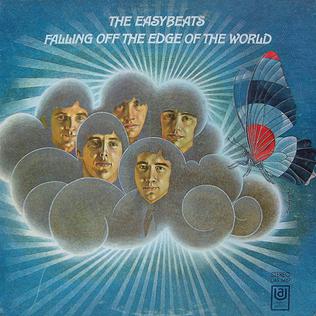
Falling Off the Edge of the World was the North American version of The Easybeats album Vigil. It was issued in October 1968 with a different album cover and running order from the UK release. This version was pared down to 12 songs from 14, omitting "Sha La La" and "We All Live Happily Together". A different recording of the title track replaced the more common version from the Australian and UK/European releases. This version of the album has also been released on CD, paired with Friday On My Mind on the Collectables label.

"Sad and Lonely and Blue" is a song written by Stevie Wright and George Young, recorded by their band the Easybeats in 1965. The song was written in response to the group being labelled as "pop musicians" from their previous singles "She's So Fine" and Wedding Ring" along with their debut album Easy. The song is based around a 12-string guitar riff played by guitarist Harry Vanda and sees influences in both British rhythm and blues and jangle pop. Released as a single on 4 November 1965, it was a chart failure compared to their previous releases, only reaching number 21 on the Kent Music Report.


















